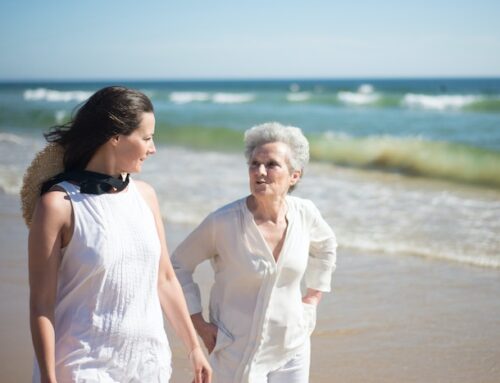Kimberly Kaskel, MA, School Counseling and Psychological Counseling, is passionate about helping her clients achieve their skills-based goals and fostering a supportive environment for learning. In her role as Executive Function Coach, Kim is fueled by her passion to provide a safe space for students filled with understanding, healing, purpose, and direction. We spoke with Kim about her practice.
RCNY: Thanks so much for taking the time to talk with us today. Your education is so interesting to me, a Master’s in School Counseling and a Master’s en passant (along the way to a Doctorate) in Psychological Counseling.
KK: I was in event planning, working in the nonprofit sector and considering doing a career change. I’ve always been drawn to helping professions so I thought counseling would be really great. Mostly because of all of the influence it had in my life, all the way from childhood up until now. It’s such a big part of my life I wanted to give back in that way. I started researching the different types of counseling out there and when I found school counseling it resonated with me. My parents got divorced when I was really young and luckily I went to the same school from K through 13, I think that really helped me.
RCNY: That was a real sense of stability for you then.
KK: It was just this amazing sense of stability when my home life was pretty chaotic. There was something about the school setting for me that was really stabilizing so that’s what drew me to school counseling. I was at Teachers College, Columbia University, for a semester when the pandemic happened.
RCNY: Oh my gosh!
KK: So everything went virtual. Yeah.
RCNY: Tell us about your practice, how you practice now.
KK: I ended up in the field of coaching, which I feel is very similar to what I would have done in a school setting, just that it’s in a private setting. I started coaching with a company that’s online which was kind of cool because I got to see a range of clients across the country. I had clients in California and in Georgia and Denver, all these places. Obviously there are downsides to being entirely virtual, as I’m sure you can imagine, especially when you’re trying to develop a rapport. This type of work is a lot easier in person.
RCNY: I was just talking with someone about that. How it’s all well and good to work virtually but there’s just something about the immediacy of it, the intimacy of being in the same air that makes a difference.
KK: Such a difference, yes. And I think we’ve even seen that post pandemic with so many kids that have suffered so much from not being able to be in a school environment. I think all of us kind of love the idea of being able to be home and be on our computer and be in our sweatpants, but in reality I think as human beings we need connection with people and, exactly, breathing the same air. Like seeing my clients, I only see them from here [shoulders] up.
I think there’s so much information that you get from a person just by being in a room with them, but virtually is how I started doing coaching. I was working with high school and college students on executive functioning skills, which I really like doing because I’m very goal oriented, task oriented. I would ask them how do you plan your day? What are your routines? What do you do when you wake up in the morning? What do you do when you go to bed?
For college students it was about figuring out how to create structure, because it’s so hard to figure that out for yourself. Freshman year in college or even sophomore in college, how do I structure my day in between my classes and my mornings and my nights and all these additional distractions, it’s all new.
RCNY: Yes, it’s all new, first time away from home. And you know you have class at this time and you have to turn this in at this time, and how do you do it with all of the rest of it?
KK: Yes, exactly.
RCNY: You get up and you don’t have any clean pants because nobody’s doing your laundry for you.
KK: Right. It’s life skills too, right? Like, how to properly take care of yourself, how to take care of your space, how to take care of your body, personal hygiene and life skills. And then life admin is always a big one.
RCNY: What’s life admin, I’ve never heard that term before.
KK: Life admin? I don’t know if it’s a term, it’s what I always referred to for myself so I started using it for my clients. It’s all your personal admin things that you need to do like scheduling appointments, going to the dentist, going to the doctor, when you’re going to therapy, you know, life admin. I’m updating my calendar, I’m making sure I have all my appointments in. And as life goes on it just gets busier. I have a son now and so I’m making sure I have his schedule figured out.
RCNY: Right, of course, keeping your schedule straight and up to date as you get more stuff along the way. That’s a great term for it, I love that.
KK: That’s why it’s my life admin, it’s not professional work. I like sitting down in front of a computer or my phone and planning out my week. Even meal prepping and figuring out what I’m going to get at the grocery store, when am I going to get my exercise in this week? What do I have going on? So I work on those skills with high school kids, and especially with college kids. To make sure they’re taking care of not just their academics but their body and their mind and those types of things.
With some students it can be very academic focused. They’ll need to have their logins for their Canvas or their Blackboard, their online portal for school. Then we’ll go through their assignments and we’ll figure out what needs to get done immediately, what’s something that we need to plan for like a big paper or project. And then we’ll work backwards and figure out, okay, on this week I need to do the outline and this week I need to do the intro and the conclusion and then the body paragraphs and things like that. We’ll plan for those things and appointments, like if we need to meet with advisors.
I had a student who was diagnosed as narcoleptic, but she had no accommodations in college and told me she was really struggling. I said to her well, you have this diagnosis and you don’t have any supports in place. How do we help manage this diagnosis and make sure that you’re getting the extra help that you need in school? And a lot of times those things can be super intimidating. I had accommodations in college and even getting them for myself, it’s a lot. It’s difficult, there’s stigma around it.
RCNY: All of a sudden you’re the different one.
KK: Yes, right.
RCNY: You’re the one who gets extra time to hand in an assignment. You’re allowed to come to class late because you have something that you need an accommodation for but it looks like you’re just getting special treatment.
KK: Right, right. And even for me, doing my masters at Teachers College. I was super happy that I got into that program. I had accommodations and I was thinking am I supposed to be here? I’m going back to grad school after however many years and I’m with a bunch of students who just graduated college and I thought, oh my gosh, this is crazy.
RCNY: I applaud anybody who goes back to school.
KK: There’s something really great about going out and experiencing the real world.
RCNY: Absolutely.
KK: When I went back for my master’s I was just so excited and ready to learn and it was so different. Knowing I was going back to college and being distracted by the social element and all those things. That is literally why I want to learn about this subject matter. I’m really interested in this and I just have a totally different perspective than some of these younger people.
RCNY: Right. You went out, you had a career, you had a life. And then you decided to go back and get your masters. Talk about life admin! That takes organizing and planning and dedication.
KK: Yes, right, exactly. So I think I can really connect with the students in the college setting who are just trying to navigate all of these systems, especially the academic systems, regardless of whether you’re in a big school or small school. I remember having to do that and how intimidating it was and how you have to jump through all these hoops and do all this stuff and reach out to this person, that person. It’s a lot to navigate on your own. So to be that advocate for the students and, especially for this one particular student that I was referring to, who was failing all of her classes. She was able to get accommodations, she was able to get exceptions and we were able to turn it around together. By the time she finished the semester she passed all the classes.
RCNY: Yes!
KK: Yeah, it was great.
RCNY: That must be wonderful because of course it’s a sense of accomplishment for them, but it’s got to be a sense of accomplishment for you too.
KK: Yes.
RCNY: That you helped this student, this person, who wanted to get an education and had something that wasn’t her fault she was struggling with and needed an advocate. Someone who knew how to get her all the stuff she needed so she could pass. That’s wonderful.
KK: Thank you, yes. That’s the driving force for me for doing this work. Whether it’s the academic, or it’s let’s get you set up with whatever type of planner you like and put all your appointments and your classes in and your due dates and just all that kind of stuff.
Most of the content that I’m working on with my students I have experienced or gone through. I feel like it’s super helpful, I get how difficult it can be for some people. And I think we all struggle with one thing or another, but to put all these systems in place and to be on your own and having to figure it all out is really tough. Especially now that everything is so accessible via the internet and we have less and less chances for in person, even just trying to talk to someone on the phone versus getting an automated.
RCNY: It’s a very frustrating process. Do you find that students calling their colleges for specific needs or answers are having trouble getting through to live people?
KK: Yes, and I think for kids who are already struggling with anxiety or depression it’s a tough thing. The big thing I had to learn in my master’s, as a quote unquote adult woman, was self-advocacy. Some of these college institutions, they’re really tough to navigate and there are some serious barriers you have to try three times to get through. You’re calling and it’s oh, no, sorry, I’m not the person, you have to go to this person. Okay, so then I go to this person and it’s oh, no, sorry, this is not my department, you have to go to that department.
These institutions that are supposed to be in place to help you actually end up creating a lot of barriers for students when they’re trying to help themselves. So it’s about the consistency, the following up, the being vocal about what your needs are. And I think especially in the power dynamic of professor student or admin person student, it’s hard to advocate. For example, this student who was trying to get accommodations, the school said we need your doctor’s note. And then they said OK, we got the doctor’s note, the doctor’s note doesn’t say the right thing, we need the doctor’s note to say this. So we had to go back and do it again.
RCNY: Oh my gosh.
KK: And I’d say OK, sure, and fill out the paperwork and submit the paperwork. And then be told the paperwork was submitted to the wrong place, you have to submit it here. I can totally understand how that would just wear a student down to you know what, whatever, I’m just going to suffer, this is too much. I can’t figure it out, I keep getting turned away.
RCNY: It’s frustrating to keep getting passed around like that, especially for a student with accommodation needs. And especially tough without an advocate, or knowing how to self advocate. And how many of us are effective self advocates? That takes a lot of practice.
KK: Yes, It’s hard. I still struggle with it sometimes.
RCNY: Me too, I think we all do.
KK: It’s a lot. It’s a lot for your average student, and a lot of the students that I work with have an intellectual disability, some of them are on the spectrum. So when these things come up for those students that’s even more difficult. So I like to be able to fill in.
And then there’s all of the new social aspects that come with high school and college. And the family dynamics, all of these things are part of the work that I do with my students. So it’s pretty all encompassing, which I like. And the hope is that each week we are making little changes, we’re able to see results that encourages them to continue to move forward. When the student says OK, this worked, I liked that, it made me feel good to accomplish something, I want to do it again – it’s great. That doesn’t always happen, but when it does it’s really awesome.
RCNY: What do you do when the parents come to you, their child needs help, they’re struggling, and the child is resistant to you? They don’t think they need a coach, they don’t want your help, they don’t want anybody poking their nose around in their business.
KK: It’s hard. I’ve definitely had clients like that. You have to try to get the buy in through connection, through building rapport. Through figuring out what their interests are and connecting with them on those things. You have to have the buy in from the kid because if you don’t then it doesn’t matter what you do. Even if they’re going through the motions, it’s unlikely that it’s going to create any long term change.
RCNY: I can imagine that even if you start working on setting goals and structuring new habits that unless they’re interested in it, nothing’s going to stick.
KK: It is like throwing spaghetti on the wall and seeing what sticks, right? You always have to try different approaches, different things that maybe they’ll be interested in. At the bare minimum I always say I want you to try it at least once, and if you try it once and you hate it and you don’t think it’s working, we’ll go back to the drawing board and we’ll try to come up with another solution. And usually students will be willing to give it a try for a few days.
Especially for the younger kids whose parents are forcing them to be there. They’re either going to sit there and waste the hour or we’re going to try some stuff and see what happens. And then for the older kids, the college kids, I think they’re more able to recognize I’m here to help. They may be reluctant, but they’re more open in a way because they’re struggling and they don’t want to struggle. Maybe this isn’t the exact avenue that they wanted to try, but they’re still willing to try because they can acknowledge that what’s going on right now isn’t really working.
And for a lot of college kids, their big issues are social. They don’t know how to meet people, they don’t know how to make friends, they don’t know where to meet people. So obviously they’re going to be super willing to hear what I have to say. They don’t always realize all the different avenues that exist on a college campus to create community. And to be able to be that person to say have you heard of this? Have you heard of that? Clubs, organizations, sports teams, Greek lives, so many avenues for creating community, is great. And it’s great to see those kids become successful. And for those kids to be happier and to feel like they have a community.
The student and I will do research together and look into what’s offered on campus. What are the possibilities? Is there some sort of peer mentoring program? Is there a club or organization that can be joined for people who love math or English or who like to write or act? Typically on campus you can find so many different avenues for connection, it’s just a matter of looking into it and seeing what’s there.
I had a client who was a college freshman, we looked into all the various clubs and organizations and she found Latin dance. And I asked her are you into that? You never talked about it. And she said not really, but it sounds kind of cool. So I said that’s great, you should go, and she went. I was continuously in awe of this girl, she tried it out and now she’s joined Greek life and she’s got all these older girls to look to for community. It’s been an amazing transformation for this very shy, introverted girl who joined a sorority and has all these friends and is thriving socially. It’s great.
RCNY: What might surprise people about your coaching method?
KK: I have my approaches, my go to tricks in my bag. Things that have been successful in the past, little immediate changes that can be really impactful. Like teaching clients about calendar alerts. I have so many clients that I’ve worked with who put things on their calendar and the forget about them. I ask them if they put an alert on the event and they say what do you mean?
RCNY: Wow, your kids don’t know about calendar alerts?
KK: Because they’re not really using these systems.
RCNY: Oh, right. It’s not their go to fun thing to do on their phone, their calendar.
KK: Right, they’re not really thrilled to set up their calendar. For me, as an adult who loves organization, I get very excited by my calendar. So I try and create that excitement for them too. Excitement around being in the driver’s seat of your own life. And knowing what you have going on in your life and being in control of those things and being able to choose what you do with your time. I think it can come across as so intimidating, but really there’s so much excitement and freedom in having this control. It’s all new, you’re not under your parents thumb anymore and it’s a great responsibility, but it’s also fun.
RCNY: With freedom comes responsibility.
KK: Yes, so trying to create excitement around that, creating these little changes. Asking my clients about what their interests are and what they like to do and finding ways that I can create connection with them. When you can get the client buy in, I think it’s the most important step. So they buy into me and what I can do for them and how I can help make their lives easier and less stressful and less anxiety provoking. And they can start to see these areas of improvement and then they’re just happier.
I like to meet my students where they are. And while I have things that I know will immediately be helpful for them, I like to hear about what systems they have in place. What systems are working for them, what systems they think need improvement, what systems we can put in place to help them. Instead of just coming in saying we need to do this, we need to do that, I start by saying what is working for you? What is not working for you? What do you like that you’re currently doing? What are you doing that needs some work or some help?
Sometimes they just say I don’t know. So then I can come in and say great, let’s do this and let’s do that and let’s get the ball rolling. But for some of the other kids they’re more particular, they have certain things that they like to do. So then I’ll try to enter their world and learn about the apps that they’re using, or the organizational systems that they’re using. The structures that they have in place that are working for them so that I’m meeting them where they are and not trying to change everything about them or make them feel like they’re not doing anything right.
RCNY: Engage rather than attack.
KK: Yes, definitely. Because again, I keep going back to the buy in, but you have to approach it so that they want to work with you. And that can be hard. I mean, sometimes with some students it’s really, really hard. But not always.
RCNY: Sometimes you have to use your tricks to work your way in.
KK: Yeah, sometimes you work your way in there. And sometimes you don’t, you know? This all comes down to personality match. Sometimes two personalities match and sometimes they don’t. And it’s not being afraid to say you might be well suited for a different coach, or it doesn’t seem like my approaches are resonating with you, would you be interested in working with another coach?
RCNY: You want to help them, but if you’re not connecting there’s got to be someone else out there who can.
KK: Right, exactly. And in this type of profession, that’s a big part of it.
RCNY: What’s your superpower?
KK: My ability to empathize. I’m a child of divorce, I’ve experienced anxiety and depression, I’ve had accommodations in college. I have personally been through a lot of what these students are struggling with. And I feel like it gives me a leg up because I can share parts of my story that I feel are useful to the work that we’re doing.
For example, the student who was unsure about getting accommodations. I shared my experience with having accommodations, talked about what that was like for me and how it doesn’t make them less valuable than another student. The fact that I’ve experienced a lot of similar situations as my clients, I think that level of connection helps me bond with my students. And it helps them have an attitude toward me of OK, she gets it, she’s been through it. She’s not just looking at me she actually experienced this, she knows what I’m going through. I think that helps me a lot in connecting with my clients.
RCNY: I’m sure it does, that’s fabulous. Thank you so much for sharing your story with us.
If you would like more information about Kim or any of our coaches, you can reach out to Cindy Feinberg, President of The Recovery Coach NY via phone or text at 631-921-4085 or by email or through her website.






Leave A Comment